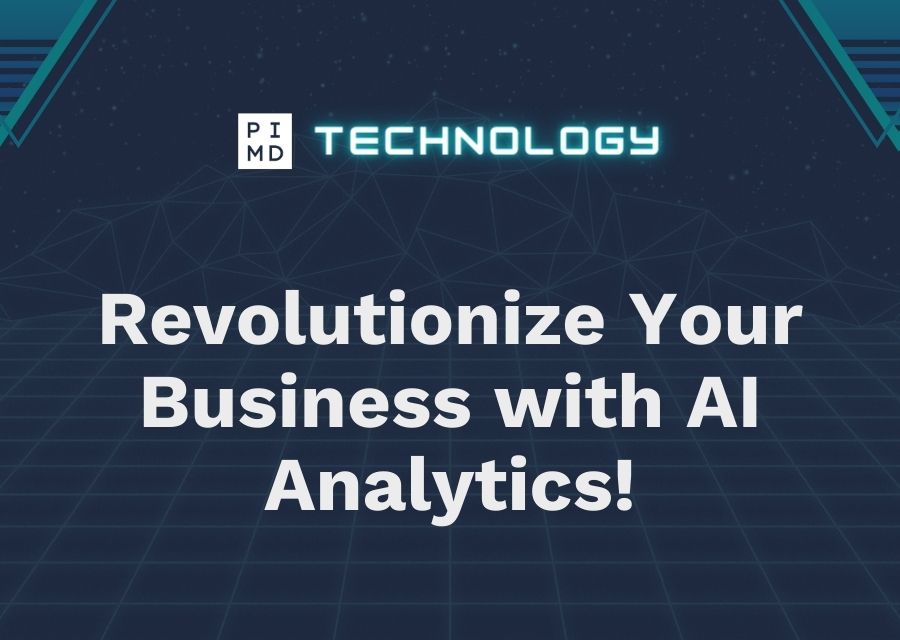
Revolutionize Your Business with AI Analytics!
This post may contain links from our sponsors. We provide you with accurate, reliable information. Learn more about how we make money and select our advertising partners.
Drowning in Data, Starving for Insights? AI Analytics to the Rescue!
Are you struggling to keep up with the ever-growing volume of customer data? Feeling overwhelmed by analyzing spreadsheets and reports yet still missing crucial insights? That's where AI comes in, offering a game-changing solution for businesses of all sizes.
Imagine predicting customer churn before they leave, optimizing your marketing campaigns across multiple channels with laser precision, or personalizing product recommendations that drive sales through the roof. AI-powered business analytics makes all this possible and more!
Table of Contents
- AI Techniques for Advanced Business Analytics
- Benefits of AI in Business Analytics
- Case Examples: AI-Powered Business Analytics for Entrepreneurs
- How to Implement AI in Business Analytics
- AI Strategies for Enhancing Business Analytics
- Embrace the Future: Start Your AI-Powered Business Analytics Journey Today!
- FAQs
AI Techniques for Advanced Business Analytics
Have you come to terms that Artificial intelligence (AI) is no longer just science fiction? In fact, in the world of business, AI is rapidly transforming how companies analyze data and make decisions.
By mimicking human cognitive functions, AI provides significant advantages over traditional analytics methods. Such as:
Automation:
AI automates repetitive tasks like data collection and cleaning, freeing up valuable human resources for higher-level analysis and strategic thinking.
Speed and Scalability:
AI can process massive datasets in a fraction of the time it takes humans, enabling businesses to gain insights from real-time data and make timely decisions based on the latest information.
Advanced Analytics:
Techniques like machine learning and natural language processing uncover hidden patterns and trends in data that would be impossible to detect manually. This leads to deeper insights and more informed decision-making, boosting areas like customer churn prediction, targeted marketing campaigns, and efficient resource allocation.
For example, Under Armour:
The sports apparel company leveraged IBM Watson's Cognitive Computing platform to develop the UA Record™ app, a personal health assistant providing real-time, data-driven coaching. This integration led to a 51% increase in revenue for their Connected Fitness accessories, reaching $80 million.

Interested in AI tools for personal or business use? SUBSCRIBE AND TUNE IN TO OUR PODCAST:
#169 Physician’s Tools of the Future: Harnessing the Power of AI, ft. Dr. Peter Kim
Benefits of AI in Business Analytics
Integrating AI into your business analytics strategy can deliver tangible results that impact your bottom line. Here are just a few key benefits:
Boost Sales and Reduce Costs:
By analyzing vast amounts of historical data and real-time trends, AI can improve sales forecasting accuracy. In fact, 52% of sales professionals use AI regularly. This allows you to optimize inventory management, reduce stockouts, and avoid unnecessary costs.
For example, HubSpot's Predictive Lead Scoring Software uses machine learning to identify the most lucrative leads by scanning thousands of data points, becoming smarter, and optimizing its scoring system over time.
Supercharge Efficiency and Productivity:
AI automates repetitive tasks like data cleaning and analysis, freeing up your team's valuable time. Analysts can focus on strategic initiatives like identifying new market opportunities or developing innovative customer segments.
For example, AI can be utilized for anomaly detection, identifying unusual patterns in data that may indicate errors, system glitches, or fraudulent activities. This capability is particularly useful in retail companies, where AI can flag transactions with unusually low prices for further investigation, ensuring data integrity and preventing financial losses.
Deeper Customer Insights, Personalized Engagement:
AI analyzes customer data from multiple sources, uncovering hidden preferences and predicting buying behavior. This empowers you to create personalized marketing campaigns that resonate with individual customers.
A great example is Netflix, which has been using data analysis and machine learning to offer personalized content recommendations to its users. This AI-powered recommendation system considers a user's viewing history, search history, and ratings, as well as content-related data like genre and director. Netflix's system is responsible for 80% of the content watched on the platform and has saved the company over $1 billion in customer retention costs. Furthermore, Netflix uses AI to optimize its content creation process, tailoring its productions and marketing strategies based on viewer data

Don't miss the Leverage & Growth Summit this winter, a unique event tailored for physicians exploring entrepreneurial and growth opportunities beyond traditional clinical roles. It's an enriching platform offering inspiring keynotes from successful physician entrepreneurs, interactive workshops on various fields like digital health and investment, invaluable networking with like-minded professionals, and insightful panel discussions on healthcare trends.
This summit isn't just a conference; it's a movement towards expanding your professional horizons, empowering your entrepreneurial spirit, and connecting with pioneers reshaping healthcare. Mark your calendars for a transformative experience that promises to redefine the intersection of medicine and entrepreneurship.
Case Examples: AI-Powered Business Analytics for Entrepreneurs
Integrating AI into your business analytics processes requires a strategic approach. Here are some hypothetical examples of issues your business may face and how AI can assist in resolving them.
Case 1: Boosting E-commerce Sales with Personalized Recommendations
Challenge: A small fashion e-commerce store struggled to convert website visitors into buyers due to generic product suggestions.
Solution: They implemented an AI-powered recommendation engine that analyzes browsing history and purchase patterns.
Results: Personalized recommendations led to a 25% increase in conversion rates and a 10% boost in average order value.
Case 2: Predicting Customer Churn with AI-Powered Analytics
Challenge: A subscription-based service faced high customer churn, impacting their recurring revenue.
Solution: They leveraged AI to analyze customer data and predict churn risk factors.
Results: Early identification of at-risk customers allowed them to offer targeted incentives and retention programs, reducing churn by 15% and saving significant revenue.
These are just a glimpse of the possibilities. Take the time to explore AI tools tailored to your industry and budget. Even small businesses can use AI to gain a competitive edge and achieve remarkable results.
How to Implement AI in Business Analytics
Implementing AI in your business analytics might seem daunting, but it's more accessible than you think. Here's a practical guide to get you started:
Phase 1: Define Your AI Mission
Ask yourself: What are your biggest business challenges? Where can data-driven insights make a difference? (e.g., improve customer churn prediction, optimize marketing campaigns)
Set SMART goals: Define specific, measurable, achievable, relevant, and time-bound goals for your AI implementation. (e.g., reduce customer churn by 10% within 6 months)
Identify data sources: Pinpoint the data you'll need to train your AI models and ensure it's accessible and well-organized.
Phase 2: Choose Your AI Tools
Explore free and open-source platforms: Resources like Google AI Platform or Amazon SageMaker offer free tiers for experimentation.
Evaluate paid platforms: Consider IBM Watson, Microsoft Azure AI, or smaller industry-specific solutions based on your needs and budget.
Seek expert guidance: Consult with data scientists or AI specialists for tailored recommendations and implementation support.
Phase 3: Prepare for Success
Clean and organize your data: Ensure consistent formatting, address missing values, and remove duplicates using tools like OpenRefine or Trifacta Wrangler.
Train your team: Offer workshops or online courses on AI fundamentals and responsible AI practices. Resources like Coursera or Udacity provide various options.
Start small and scale thoughtfully: Begin with a pilot project on a specific use case before scaling up to avoid overwhelming your team or resources.
Remember, AI is a powerful tool, but responsible implementation is crucial. Prioritize data privacy, ethical considerations, and explainability of your AI models to build trust and ensure long-term success.
By following these steps and leveraging available resources, you can unlock the power of AI and transform your business analytics, gaining a competitive edge and achieving your strategic goals.
AI Strategies for Enhancing Business Analytics
Maximizing the impact of AI in your business analytics goes beyond simply adopting the technology. Here are three key strategies to guide your journey:
1. Continuously Fuel Your AI Engine with Knowledge:
Subscribe to industry publications and newsletters: Stay informed about the latest AI advancements and emerging trends.
Explore online courses and workshops: Upskill your team with the latest AI knowledge and best practices.
Attend industry conferences and events: Network with experts and gain valuable insights from real-world case studies.
By taking these steps, you can ensure your AI strategies remain relevant and evolve alongside the rapidly changing technological landscape.
2. Break Down Silos and Collaborate for Success:
Establish cross-functional AI teams: Bring together IT, data science, and business units for aligned goals and efficient implementation.
Set up regular communication channels: Foster open communication and information sharing between teams to avoid misunderstandings and roadblocks.
Utilize collaboration tools: Leverage project management platforms and data visualization tools to facilitate seamless collaboration and decision-making.
Remember, successful AI implementation thrives on collaboration and shared understanding across departments.
3. Build Trust with Transparency and Explainability:
Invest in explainable AI (XAI) tools and techniques: Make your AI models interpretable and understandable for trust and ethical deployment.
Communicate the rationale behind AI-driven decisions: Clearly explain to stakeholders and decision-makers how AI models arrive at their recommendations.
Prioritize data privacy and security: Employ robust data governance practices to safeguard sensitive information and maintain user trust. By focusing on explainability and transparency, you can ensure responsible AI usage that benefits your business while earning the trust of your customers and employees.
Unlock the full potential of AI in your business analytics by implementing these actionable strategies. AI is a powerful tool, but its success hinges on continuous learning, effective collaboration, and responsible deployment
Embrace the Future: Start Your AI-Powered Business Analytics Journey Today!
AI has become an indispensable asset in business analytics, offering a competitive edge in the data-driven era. By understanding its benefits, challenges, and implementation steps, you can unlock valuable insights, make informed decisions, and propel your business forward.
But starting your AI journey can seem daunting. Don't worry, we're here to help!
DO YOU KNOW THAT WE OFFER FREE AI TOOLS? WE HAVE ONE THAT WILL GENERATE THE BEST PROMPTS. AND A CHATGPT CHEAT SHEET THAT WILL LEVEL UP YOUR AI EXPERIENCE. GET THEM NOW!
Remember, in the age of data, AI is not just a tool; it's a strategic advantage. Don't wait to unlock its potential and transform your business! Start your journey today and watch your company reach new heights.
And don't forget! We have a collection of free AI Tools that your business can use. Take the time to explore and don’t miss out!
IF YOU WANT MORE CONTENT LIKE THIS, MAKE SURE YOU SUBSCRIBE TO OUR NEWSLETTER TO GET UPDATES ON THE LATEST TRENDS FOR AI, TECH, AND SO MUCH MORE.
Peter Kim, MD is the founder of Passive Income MD, the creator of Passive Real Estate Academy, and offers weekly education through his Monday podcast, the Passive Income MD Podcast. Join our community at the Passive Income Doc Facebook Group.
Frequently Asked Questions
Enhanced Insights: AI can analyze vast amounts of data quickly and uncover hidden patterns that humans might miss. This leads to deeper insights, better decision-making, and improved business performance.
Automated Tasks: AI can automate repetitive tasks like data cleaning and report generation, freeing up human analysts for more strategic work. This boosts efficiency and productivity.
Predictive Analytics: AI-powered models can predict future trends and outcomes with high accuracy. This allows businesses to proactively address risks and seize opportunities.
Personalized Experiences: AI can personalize customer experiences by analyzing individual preferences and behavior. This leads to increased customer satisfaction and loyalty.
Real-time Analysis: AI can analyze data in real-time, enabling businesses to respond quickly to changing conditions and make data-driven decisions on the fly.
Start small: Begin with pilot projects to identify areas where AI can add value and build your expertise gradually.
Invest in talent: Hire or train data scientists and analysts who understand AI technologies and business context.
Prepare your data: Ensure your data is high-quality, clean, and organized for AI algorithms to function effectively.
Choose the right tools: Select AI tools that align with your specific needs and budget.
Focus on Explainability: Ensure your AI models are transparent and explainable to build trust and understanding.
Data Availability and Quality: Businesses may lack the necessary data volume or quality for effective AI implementation.
Algorithmic Bias: AI models can perpetuate existing biases in data, leading to unfair or discriminatory outcomes.
Explainability and Trust: Understanding how AI models arrive at their conclusions can be challenging, hindering trust and adoption.
Cost and Resources: Implementing and maintaining AI solutions can be expensive and require specialized skills.
Ethical Considerations: Businesses need to consider the ethical implications of using AI, such as privacy and fairness.
Embedded AI: AI will become seamlessly integrated into business processes and applications.
Democratization of AI: User-friendly tools will make AI accessible to a wider range of business users.
Focus on Explainability and Fairness: Explainable AI techniques will gain prominence to ensure transparency and address bias.
Responsible AI Development: Ethical considerations will be prioritized throughout the AI development and deployment process.
Rise of Hyperautomation: AI will automate even more complex tasks, transforming business operations.
Data quality is paramount for AI-driven business analytics. Poor-quality data leads to inaccurate, unreliable, and potentially harmful results. Here's why data quality matters:
Garbage in, garbage out: AI models learn from the data they are trained on. If the data is inaccurate or incomplete, the models will make flawed predictions.
Biased outcomes: Biased data can lead to AI models that perpetuate existing biases, resulting in unfair or discriminatory outcomes.
Wasted resources: Investing in AI with poor-quality data is a waste of resources and can erode trust in AI solutions.
Further Reading
Disclaimer: The topic presented in this article is provided as general information and for educational purposes. It is not a substitute for professional advice. Accordingly, before taking action, consult with your team of professionals.

